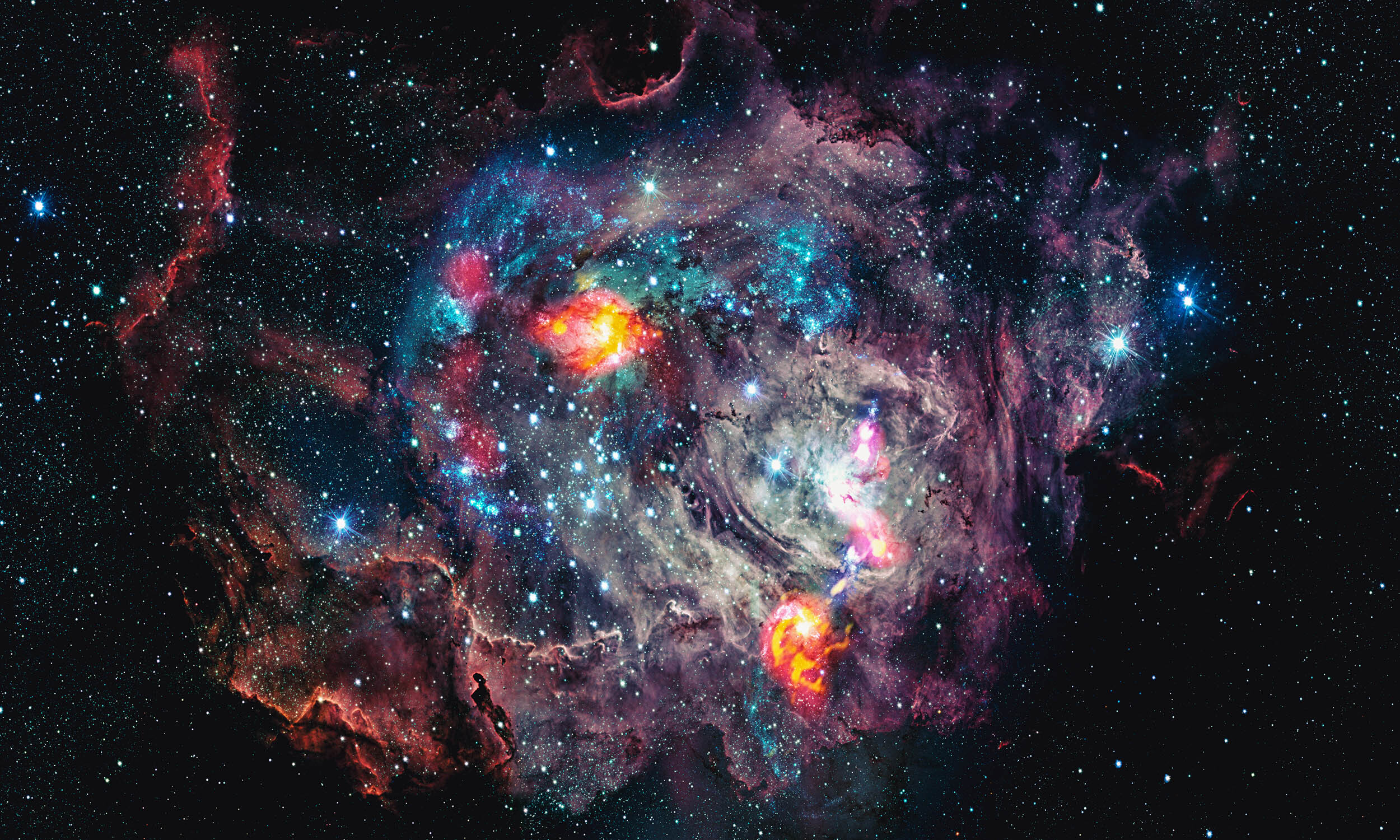Heh
“Tired light” has been theorized before, and it just doesn’t hold up to most of the evidence gathered.
It’s entirely possible that there’s something there, but most data currently backs up the Lambda-CDM model of the universe.
https://en.wikipedia.org/wiki/Lambda-CDM_modelOnly time will tell if this theory pans out, but I wouldn’t put much money on it.
This model explores the notion that the forces of nature diminish over cosmic time and that light loses energy over vast distances
Losing energy… to what?
You try being a bright ray of sunshine for everything around you all day every day. Sometimes you just get tired, ya know?
Wildass hypothesis I just pulled out of my ass with an undergraduate degree in applied physics: maybe interaction with particles emerging from quantum vacuum?
Okay, that sounds like great technobabble. I’m going to watch star trek now ;)
Seems you may be on to something. Virtual particle interactions seems to be a hypothesis for tired light.
To test this I suggest we reprogram the deflector dish to emit a low-power tachyon pulse to see if we can excite the non-baryonic mass interactions.
Don’t forget to reverse the polarity of the neutron flow!
Shit, if only my turbo encabulator wasn’t broken!
deleted by creator
You sound like you know what you’re talking about. I’m taking notes. 📝🧐
It’s those damn inertial dampeners again
This doesn’t answer the question in the context of this theory, but the current understanding is that light does lose energy as it travels through expanding space. As the space it’s in expands, the wavelength gets longer, and the energy goes down. It doesn’t go anywhere; energy just isn’t conserved in an expanding space-time.
If the light loses energy, then it must surely lose it to something? And if your last point that energy isn’t being conserved in our universe, in which case we are either in some deep shit with the first law of thermodynamics, or our universe isn’t an isolated system.
Seems energy is not conserved.
https://www.preposterousuniverse.com/blog/2010/02/22/energy-is-not-conserved/
The thing about photons is that they redshift, losing energy as space expands. If we keep track of a certain fixed number of photons, the number stays constant while the energy per photon decreases, so the total energy decreases.
Further into the article he says that, "It would be irresponsible of me not to mention that plenty of experts in cosmology or GR would not put it in these terms. We all agree on the science; there are just divergent views on what words to attach to the science. In particular, a lot of folks would want to say “energy is conserved in general relativity, it’s just that you have to include the energy of the gravitational field along with the energy of matter and radiation and so on.” "
So energy is conserved on the whole, it’s just not conserved if you consider photons apart from their greater context.
Ok. Smarter people probably thought of this, and probably found my hypothesis to be impossible. But what if… It is the the other way around. What if photons are losing energy because they are expanding spacetime. Like tiny little springs expanding out.
The energy is actually not conserved across the universe in general relativity, as it is currently understood. Conversation of energy is due to the time symmetry, which the expansion of space breaks.
BTW, thanks! This comment sent me down a fascinating rabbit hole. It had simply never occurred to me that energy conversation didn’t apply in an expanding universe!
“Energy is conserved in general relativity, it’s just that you have to include the energy of the gravitational field along with the energy of matter and radiation and so on.”
Quote taken from Atzanteol’s article.
To the dark matter, of course.
;)
It’s probably not that the light is losing energy it’s just that the distance it travels over time (the time we “know” is supposed to take for a given distance) appears compressed because of unknown/unseen gravitational forces.
Think of it like this: If there were only one star in the universe and it emits a particle of light we could calculate the distance it would travel over time. Yet we know that star will still have a gravitational effect on that light… No matter how far away it gets.
That’s what they mean by light “losing energy”. Is the energy actually “lost”? Not really. Is this slowing (aka appearance of lost energy) caused by dark energy/dark matter or something more fundamental like spacetime itself being stretched or compressed due to the gravity of astronomical objects we can see or “dark matter”/“dark energy” or… ? We don’t really know for certain yet!
It’s probably not that the light is losing energy it’s just that the distance it travels over time (the time we “know” is supposed to take for a given distance) appears compressed because of unknown/unseen gravitational forces.
This doesn’t seem to be at all what tired light proposes though. What you’re explaining sounds like red-shift due to an expanding universe. From what I can tell they claim it actually loses energy through interaction with “other things” in the universe.
Entropy, capital “E”.
I didn’t see anything in the paper about the rotational speed of galaxies. Was that accounted for?
Or the effect we see on gravitational lensing that is accounted for by “dark matter”? I don’t see how that could be explained by “light losing energy”…
Modified Newtonian dynamics attempts to account for that.
Not an astronomer but if I read the article correctly the observations gathered about galaxies rotating and colliding would be explained instead by regional changes in what were previously assumed universal constants, which would be very interesting if true but 1 paper isn’t consensus yet
Man, lots of people in this thread seem happy to accept any wild, physics-breaking idea rather than accept that there’s just a bunch of matter we can’t see.
I think it goes beyond not being able to “see” it and goes to we can’t detect it at all. Doesn’t dark matter just fill in the mathemagical holes with some numbers to make it all work?
We can detect its gravitational influence, as it interacts via gravity. The issue being that gravity is a weak force, and so there’s a lot of room for speculation.
But there is a lot of evidence backing up dark matter existing. But it’s not definitive yet.
I get that but it still sounds woo-woo since we can’t directly detect it. I’m not naysaying since I realize it’s the best we have and I’m not smart enough to come up with anything better.
I mean, I guess it depends on what you mean by “directly detect”. We measure neutrinos by having photoreceptors in huge tanks of very pure water deep under old salt mines… which hardly seems more direct than looking at where galaxies and stars are moving and calculating the gravitational pull and noticing that something is missing…
Dark matter is matter that we infir to exist only on its gravitational effects. We’ve observed its existence by the fact that it seems to clump up in the middle of two massive super-solar structures following a collision.
We can indirectly detect dark matter thru gravitational lensing. That is how NASA created this map showing the actual locations of dark matter in tinted blue.
https://science.nasa.gov/missions/hubble/hubbles-dark-matter-map/
That’s a cool one!
you can also sort of directly see it with certain colliding galaxies
I read several articles to try to understand this. This one was the most helpful to me.
https://bigthink.com/starts-with-a-bang/universe-13-8-or-26-7-billion-years/
Non paywalled version hopefully
I’m sure the article is great… IF I COULD READ IT

It says right there that the Galaxy is Folded into a Z…
/J
Made me spill my tea
- Don’t use Chrome
- Use Firefox
- Install unlock origin on android Firefox
- ???
- Profit!
Sorry I have so many paywalls and ad blockers going I had no idea it even had one.
Same for me but only on Desktop :/
Added it to that archive place for you and updated my first post.
Greatly appreciated! I love this site :D
How long until the young earth dipshits jump on this as “evidence” to claim that if there’s room to question whether the universe is 13.8 billion or 26.7 billion years old, that means it must actually be 6000?
Link to original study cited by article.
As I suspected, I did not understand the summary.
The Covarying Coupling Constants theory posits that the fundamental constants of nature,[…], are not fixed but vary across the cosmos.
This undermines current fundamental axiom of science that laws of physics are constant across universe. Until we go there and measure them to be actually different. This hypothesis doesn’t have a leg to stand on.
I’m skeptical of this theory as well, but I’d point out that our observations show that at galaxy scales, gravity is much stronger in certain places than we’d predict using our current model of gravity and the matter we can otherwise detect, and at even larger scales the acceleration of the universe’s expansion is being driven by something we don’t understand.
Right now, the dominant theory in cosmology is that each of these observed phenomena are driven by dark matter and dark energy, but we don’t have any direct evidence of the existence of either, just indirect evidence that stuff doesn’t behave as we might expect.
So it’s a choice between theories that don’t make intuitive sense, and break some fundamental assumptions about physics.
Tired light makes a lot of sense to me 🥱
IANAP, but isn’t universal expansion understood to be accelerating? How would “weakening forces of nature” account for that? Assuming this energy could be “lost” (breaking an even longer standing and well tested principle of physics), that loss wouldn’t accelerate anything. At best the speed would remain neutral.
The tired light theory is an alternative explanation to the red shift of distant light that says it’s not because distant objects are all moving away from us but instead that the light somehow loses energy as it travels, which lowers its frequency.
There was another alternate theory that suggested everything was shrinking instead of the universe expanding (thus wavelengths seem longer by the time they get to us).
Personally, I’m more “open to the idea” than “sold” for the idea of the universe’s accelerated expansion. I like theories that eliminate the need for dark matter or energy, especially given that the current ones requiring them assume that they make up 95% of everything. It just seems more likely that we don’t understand things as well as we do than to assume we’re right about everything we think but just need to add 19 times what’s already here to balance it all out.
“Contrary to standard cosmological theories where the accelerated expansion of the universe is attributed to dark energy, our findings indicate that this expansion is due to the weakening forces of nature, not dark energy,” he continued.
So both dark matter and dark energy don’t exist?
So what did cern say they where trying to make?
hogwash
There’s no dark matter, only dimension flattening weapons being fired at each other by advanced aliens.
The whole “dark matter” thing has never sat right with me. It always seemed like a desperate attempt to explain what we see. I’m not saying I know enough to have an informed opinion, but it has always seemed wrong. It is matter we can’t detect in any way except for gravity? Nah. The forces of nature changing due to expansion? Fits better somehow. Anyway, what do I know? I entertained the idea that it was time that was changing due to the expansion, but I couldn’t get it to fit. This seems more plausible.
That’s exactly what Dark Matter is. Scientists saw that galaxies were spinning faster than expected, did some math, and figured out that based on current, known physics, they wouldn’t be able to stay together.
So they said “huh, must be additional matter that we can’t account for, let’s call it Dark Matter for the time being, cause we can’t see it.” It might be one big type of thing, it might be a thousand smaller types of things that all add up to this collective Dark Matter, but whatever it is, it doesn’t behave the same way we expect normal, everyday matter behaves.
Other scientists said that we must not understand something about physics and gravity at larger scales.
Other scientists said that light must not act the way we expect, and it’s throwing off our measurements.
Based on follow up research, there is more evidence for unaccounted for matter, than the other options.It’s entirely possible that none of those options are correct, but most of the data we have right now points to Dark Matter is the best fit for the evidence we have.
Excellent summary.
I’m aware we’ll never find the bottom truth, whatever that may be, it’s only better and better models. Sometimes though, the model chosen by the scientific community isn’t really a good one, despite fitting most of the data. I think dark matter, like the aether(spelling?), is one of those models. Again, I base this solely on the clunky, ad hoc feeling of the dark matter model and not of anything more substantial than that. If I’m wrong and they manage to find a chunk of dark matter I’m fine with that. The chunk part was a joke, btw, I’ll settle for detection or proof of existence.
When we discover someone we don’t understand we often make a simplistic metaphor to fit the data until we have better understanding. Like the Bohr model of the atom, or Newton’s theory of gravity. Dark matter plugs the hole right now and does it with a minimum of contrivance (Occam and whatnot)
Or the aether or the flat earth model. I know all this, but I still believe it is a bad and lazy model that stopped a lot of people from trying to find something else that could explain what we’re seeing, or not seeing actually. There is too much gravity, yes. What could produce that effect? Shit we aren’t seeing, dark matter, sure. But what if there’s no ‘extra’ matter? What other thing could produce the appearance of too much matter? Is time changing in some way we don’t know? Is light slowing down/going faster due to the expansion? Is there something else that we thinks is constant that is actually changing over time? Should I really smoke this much? I don’t know any of this obviously but I have a distinct feeling we are missing something with ‘dark matter’ as a model. I get why we use it, but I don’t like it. When we create a model, we fix it in our minds and it is very hard to break free from that mindset. Look what it took before we accepted that time is relative. What else is relative? What, besides mass, aren’t we seeing?
deleted by creator
Of course I’m not the first to think about it and of course I’m not as smart as many, or most of those guys. But if you put up a grand model that’s largely unsubstantiated too early and everyone and their dog runs with it, you create a bias to try and prove it and more resources will be added to that than to find alternative explanations that night also fit the data. That is basically my gripe with dark matter as a name for the discrepancy between observable matter and “invisible” matter. It is too ad hoc, mostly added to try and save as much as possible of present understanding of how shit works. Must’ve stepped on a toe there, chief.
I really shouldn’t feed the trolls, but I have to ask - is she hot or is she a used up tramp like your mum?
I too don’t really know enough to have an informed opinion, but I don’t think “plausible” has much meaning in physics. It’s more a question of whether the mathematics supports the theory and/or if it can be proved somehow.
There are plenty of things that the mathematics predicted that seemed completely implausible, but were later verified to be true. “Quantum Entanglement” jumps to mind as something Einstein dismissed as “spooky action at a distance”, but it has since been confirmed.
I think you could consider all of physics or even all of science to be made up of placeholders meant to keep things moving until a better explanation comes along.
Yeah, “plausible” was the wrong word to use. Maybe “more elegant”? Then again, the truth (not that there is one, precisely) isn’t always elegant.
I think you could consider all of physics or even all of science to be made up of placeholders meant to keep things moving until a better explanation comes along.
I agree. I would add that intuition, common sense, and ideologies are also just placeholders in our journey to a better world.
The way I see it, Dark Matter is just a psuedonym for “Whatever is causing gravity to work differently at a galaxy scale than at a solar system scale”. And further, Dark Energy is just a term for “Whatever is causing gravity to work differently at an inter-galactic scale than at a intra-galactic scale or solar system scale”.
But, if we want to entertain the technical aspects of the thought, there’s nothing in the definition of Matter that says it interacts with anything besides gravity (light, magnetism, etc) on its own. Just that it has mass (ie generates gravity) and cant occupy the same space as other mass. We already know via colliders that the higs bosson is the sub-particle solely responsible for Mass, way smaller than the scale of an atom. And we also know that magnetism, electric charge, and by extension light rely on electrons, which exist only at the atomic scale. So its not implausible to think that mass can exist separate from any of the things that we can detect with our other favorite methods (pretty much just different wavelengths of light) besides just the gravity they generate. In this case, gravity IS the thing we’re using to detect it.
A few things not quite right here. Particles are given mass through interacting directly with the Higgs field itself. They don’t need the boson to be involved. Due to the way the math works out, the Higgs field has a non-zero value everywhere, so everything that interacts with that field is given mass by that.
Also, we know of weakly interacting matter such as neutrinos that can pass directly through other matter most of the time already. Things can be in the same place as long as the fields they’re part of don’t interact in a way that stops it.
Magnetism, electric charge, and light rely on photons, not electrons. Photons are the bosons of the electromagnetic field. Bosons are called force carriers. They get exchanged any time an electromagnetic force acts on anything. Electrons are a particle and made from the electron field. They are involved in a lot of electromagnetic interactions via photons, but not all of them.
“Whatever is causing gravity to work differently at a galaxy scale than at a solar system scale”.
Nothing is. Gravity works the same. We don’t just infer dark matter from gravity fields. We can detect and map the exact locations of dark matter thru gravitational lensing.
https://science.nasa.gov/missions/hubble/hubbles-dark-matter-map/
Honestly, This makes a lot of sense. Intuitively it seemed strange to me for us to just happen to be in a universe that’s barely older than the first set of stars out there, when there’s so much matter in the universe that would have needed to have formed over billions of years in the heart of stars, which would then reach the end of their life cycle and nova – that all this happens to line up awfully closely, especially with all the debris from those dead stars would need to scatter over light years of distance.
I am 100% with you on this.
It’s very pop science, but I feel the same way about dark energy and string physics. It’ll be nice when calculations can be made and we don’t need unknown, unidentifiable, unquantifiable variables













